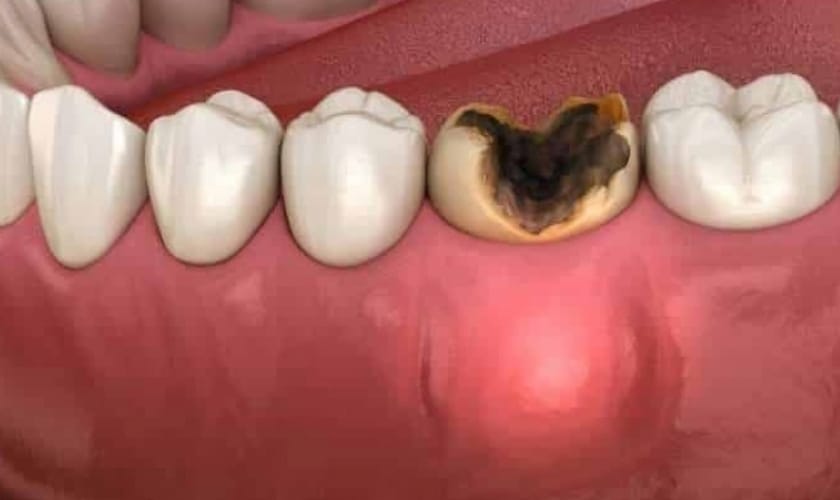When it comes to your oral health, a black tooth is more than just a cosmetic concern—it could be an indication of a serious dental issue. If you notice that one or more of your teeth have turned black or are starting to darken, it’s crucial to understand what might be causing this change and whether it requires immediate attention.
This blog will explore the potential causes of a black tooth, the urgency of seeking dental care, and the treatment options available.
What Causes a Tooth to Turn Black?
A tooth can turn black for several reasons, ranging from minor staining to more serious dental issues. Knowing the potential causes can help you determine the necessary steps to take.
Tooth Decay
- Cavities and Bacterial Infection: One of the most common reasons for which a tooth turns black is due to severe decay. When cavities are left untreated, the decay can penetrate deeper layers of the tooth, eventually affecting the pulp and root. The tooth may turn black as a result of necrosis (death of the tissue).
- Plaque Build-Up: Over time, poor oral hygiene can lead to the accumulation of plaque, which harbors bacteria. These bacteria can erode the enamel and dentin, leading to decay and discoloration.
Dental Trauma
- Injury to the Tooth: Trauma, such as a knock or chip, can damage the blood vessels and nerves within the tooth. This injury can cause the tooth to die, resulting in a black or darkened appearance.
- Cracks or Fractures: Internal cracks or fractures, even if not visible, can allow bacteria to enter, leading to decay and discoloration.
Staining from Medications or Substances
- Certain Medications: Some antibiotics, such as tetracycline, can cause permanent discoloration of the teeth if taken during childhood when the teeth are still developing. This staining can sometimes appear black or dark gray.
- Substance Use: Smoking, drinking dark-colored beverages like coffee or red wine, and using other substances like chewing tobacco can lead to external stains that may eventually turn a tooth black.
Restorative Materials
- Metal Fillings: Older metal fillings, particularly those made from amalgam, can sometimes cause the tooth to darken over time, leading to a blackened appearance.
Internal Bleeding
- Pulp Damage: If the pulp inside the tooth is damaged and begins to bleed, the blood can pool inside the tooth, leading to a dark or black color. This situation is often the result of trauma and may require immediate dental care.
Is a Black Tooth an Emergency?
A black tooth can be a dental emergency, especially when accompanied by certain symptoms. The urgency of addressing a black tooth depends on its underlying cause.
Here’s how to determine if your situation requires immediate attention:
- Rapid Discoloration: A tooth that suddenly turns black could be a sign of trauma or severe decay, and you should seek immediate attention to prevent complications.
- Infection: Signs of infection include gum swelling, pus, fever, or a foul taste in your mouth. Infections can spread quickly and become life-threatening if not treated promptly.
- Severe Pain: Throbbing, persistent pain, especially when biting or chewing, could indicate nerve damage or infection.
- Swelling: Puffy gums around the black tooth or facial swelling could be signs of an advancing infection that needs prompt antibiotics.
- Gum Abscess: Pus or swelling around the gum line of the affected tooth could indicate an abscess, which requires immediate attention to prevent the spread of infection.
If you notice any of these symptoms along with a black tooth, it’s crucial to contact your Dublin dentist right away and schedule an emergency appointment.
Treatment Options for a Black Tooth
The treatment for a black tooth will depend on the cause and severity of the discoloration:
1. Tooth Decay
- Filling or Crown: If the black tooth is due to decay, your dentist may remove the decayed portion and restore the tooth with a filling or crown, depending on the extent of the damage.
- Root Canal: In cases where the decay has reached the pulp, a root canal may be necessary to remove the infected tissue and save the tooth. After the root canal, the tooth is usually capped with a crown.
2. Dental Trauma
- Internal Bleaching: If the black tooth is the result of trauma but is still structurally sound, your dentist might recommend internal bleaching to lighten the tooth from the inside out.
- Root Canal: If the trauma has led to nerve damage, a root canal may be needed to remove the dead tissue and prevent infection.
3. Restorative Options
- Veneers or Bonding: For teeth that are structurally sound but discolored due to staining or old fillings, cosmetic options like dental veneers or bonding can be used to improve the tooth’s appearance.
4. Extraction
- Severe Decay: In cases where the tooth is too damaged to be saved, extraction might be the only option. After extraction, you can discuss options for replacing the missing tooth, such as a dental implant or bridge.
A black tooth is not something to ignore, as it often indicates an underlying problem that could worsen if left untreated. While not all cases are dental emergencies, it’s important to consult your dentist as soon as you notice any discoloration. Early intervention can save the tooth, prevent infection, and address cosmetic concerns, ultimately preserving your oral health.
If you’ve noticed a black tooth or are experiencing any related symptoms, act quickly—schedule an appointment with your Dublin dentist today to safeguard your dental health.

